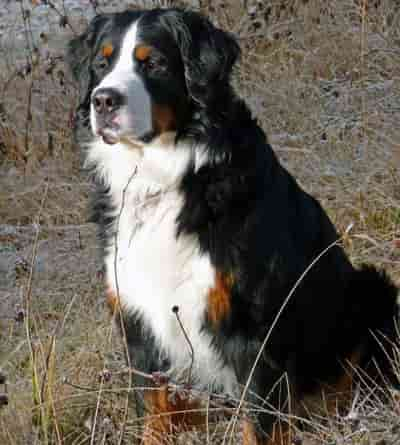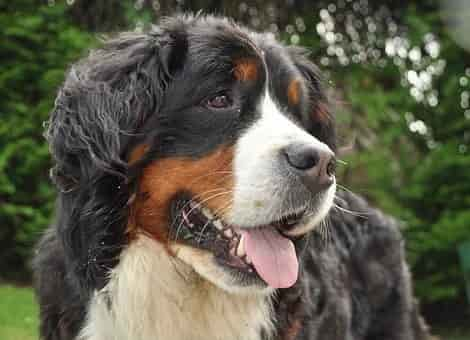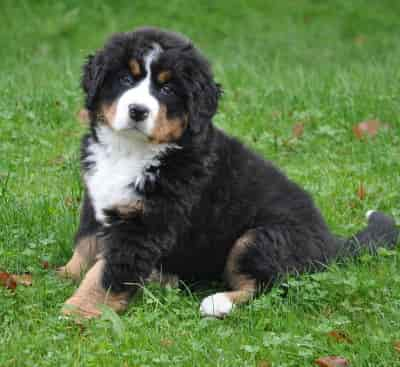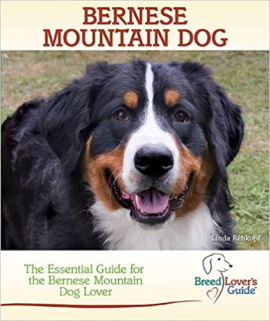Bernese Mountain Dogs
Majestic, Gentle, and Devoted
While the Bernese Mountain dogs we know today originated in Switzerland, their distant ancestors are believed, by some, to have existed around two thousand years ago living alongside Roman armies.
Subsequently, when the Romans invaded Switzerland, their dogs - speculated as Molosser type breeds, arrived with them and so began the evolution of the Bernese Mountain dog aka "Berner".
 Courtesy: Art Tower
Courtesy: Art TowerThe Berner worked on Swiss dairy farms and likely as not they contributed their working talents for herding, droving and pulling carts as well as being the farmer's companion and watchdog.
The Berner is one of four Swiss mountain dog breeds, the others being the Greater Swiss mountain dog, the Entlebucher mountain dog, and the Appenzeller Sennenhund. However, he is differentiated by his long silky coat.
Most of the very early history of this ancient dog breed, as you may have already guessed, is not born out by documentation. However, later historical evidence does exist in the form of paintings from the 17th and 18th centuries showing farm dogs bearing a strong likeness to the BMD.
The breed was recognized by the American Kennel Club in 1937.
Bernese Mountain Dogs Appearance
The look of this rugged mountain dog is impressive to say the least. Solid in appearance, symmetrical and well-balanced, he typifies the ideal physical characteristics of a working dog.
Males typically measure: between
25
and
27-1/2
inches at the withers
while weighing up to 115 pounds.
Females measure: between
23 and 26 inches at the withers and weighing up to 65 pounds.
Both males and females of this breed share the same compact body and large chest.
Ears: The medium-sized ears are set high are triangular in shape. They normally hang close, but are raised and forward when stimulated.
Tail: The tail is bushy and carried low except when alert when it will be lifted upward.
Head: The skull is flat and the muzzle is strong and straight with a black nose.
Eyes:
The eyes are almond-shaped dark brown in color with eyelids that fit closely.
Teeth: Berners typically have large, strong jaws with a set of 42 teeth.
The teeth meet in a scissors bite.
The coat is made up of three vivid colors with the dominant color being black. Rich rust markings appear in several areas of the body and there is a striking white blaze around the muzzle and chest.
The coat should have a natural sheen, be of medium length and can be slightly wavy or straight.
Fairly frequent brushing is needed to remove any accumulated dirt, prevent mats and tangles from forming and to keep it looking its gorgeous best.
A large amount of daily shedding is common to the Berner which brushing will remove - thereby keeping it from being deposited around your home!
Heavy shedding of the undercoat only occurs seasonally - one or twice a year. During this "blowing" of the coat, more frequent brushing, as well as bathing, will speed up the process.
The FURminator is a very popular grooming tool Berner parents use for de-shedding.
If the dog is to be shown the coat should remain natural without any unnecessary trimming.
In addition to coat care,
Berner's ears should be checked regularly for mites or signs of infection, teeth brushed often, nails clipped, plus an overall check of vital signs weekly.
Characteristics of the Berner
While this breed is very confident and has shown to be an independent thinker, their history includes years of being completely
domesticated pets.
In fact, they have a strong desire to be included in every part of family life and will absolutely
not do well left alone for extended periods. Prospective owners who ignore the Berner's need for companionship are likely to wind up with behavioral problems.
Once a Bernese feels he is firmly a part of the family pack, owners will enjoy his playfulness and steady temperament.
The Bernese Mountain dog is known for his good-nature and affectionate personality. He is an intelligent companion with a willingness to please - an ideal combination that makes him very easy to train.
With large dogs like the Berner, who can be a tad stubborn, training is very important to establish your leadership. The most successful approach to take with this sensitive dog is one of kindness, while at the same time being firm and consistent.
Berners are encouraged, and do well with, positive reinforcement training. Early socializing is highly recommended in tandem with with basic commands - sit, stay etc., and will help him in meeting other dogs and humans.
Bernese Mountain dogs have proven to do well in the areas of conformation, obedience, carting and are a natural for therapy services.
Health Concerns of Bernese
 Courtesy: N.Doerle
Courtesy: N.DoerleThe Bernese Mountain dog's lifespan has seen quite a dramatic drop in recent years. While some may live up to eleven years, sadly it is more likely to be as little as eight or less due to a number of health issues that can affect them.
Part of the reason may also be due to a tightly controlled gene pool and a certain amount of inbreeding,
Health issues affecting Bernese Mountain dogs include:
- Cancerous tumors, which appear to be the greatest concern, especially of the genetic kind.
- The most common type of hereditary cancer is reported to be histiocytic sarcoma and this accounts for a significant number of occurrences in the Berner dogs. Symptoms include lethargy, weight loss, and decreased appetite
- Bloat: Otherwise known as gastric dilatation-volvulus (GDV) is a life-threatening condition often seen in large, deep-chested dogs. Commonly called bloat or gastric torsion, it occurs when gasses and liquids accumulate in the abdomen causing it to become enlarged and can result in a torsion or twisting of the stomach. Immediate vet attention is needed.
- Hip And Elbow Dysplasia; These are genetic joint diseases that result from abnormal development of the joints and characterized by joint weakness, stiffness, and pain. These are common conditions that affects many larger breeds. Regular vet checkups and maintaining a healthy weight can help minimize this risk. Joint health supplements may also be recommended.
- Progressive Retinal Atrophy (PRA) which is linked to a recessive gene mutation and is identified by a failing of the rods and cones of the retina. Sadly it leads to vision loss, but fortunately, a DNA test is now available to detect one form of its presence in affected dogs, providing valuable information to breeders.
- Blood Disorder: Von Willebrand’s disease, a disorder where the blood doesn’t clot properly. A test can be done for this.
- Degenerative myelopathy (DM): This is a neurological disease that affects the spinal cord;
it slowly weakens, then paralyzes the back legs, and it causes problems
with breathing, vocalizing, and eating. There is no treatment to
reverse DM, but physical therapy may help.
- Eye issues: Progressive retinal atrophy (PRA), a genetic disorder that affects the retina and can cause blindness.
Because of these health issues, it's important to purchase a puppy from a reliable breeder that only breeds dogs that been tested and cleared for these conditions and can provide proof that the parents of any puppy of interest have been so certified.
These are the health tests recommended by The National Breed Club:
- Hip Evaluation
- Elbow Evaluation
- Cardiac Exam
- Ophthalmologist Evaluation
- Degenerative Myelopathy (Bernese Mountain Dog Variant) (DM) - DNA Test
- AKC DNA Profile
- Degenerative Myelopathy (Common Variant) (DM) - DNA Test
 Courtesy: N.Doerle
Courtesy: N.DoerleHow Active Are Berners?
This is a large breed and exercise activities need to be tailored to the age and health of the dog so as not to
over stress his limbs and muscles.
Notwithstanding that all dogs need exercise, each one is unique in its physical abilities and inclinations. Learning from the breeder about the activity level of the parents of the your new dog should provide a helpful starting point for assessing the length of daily walks and play.
In general, healthy adult Bernese Mountain dogs need long walks every day, preferably during the cooler part of the day. If you enjoy hiking, this breed will not only love to accompany you, they can also carry the water and treats in a doggy backpack!
Ideal Living Conditions
The Bernese Mountain dog is definitely a dog that prefers to spend most of the time inside with family. That being said, it would be ideal for him to have access to a fenced outdoor area where owners can safely put him outside for short periods of play and to enjoy some fresh air and play.
Whether inside or out, the heavy coat of the breed would generally lean toward cooler climates when it comes to the ideal environment, but with access to plentiful water and shade, as well as a protective dog house, the Berner can be comfortable outside for brief amounts of the time even in warmer climates.
But it does bear keeping in mind that this breed has a heavy, mostly dark coat and originated in the mountains where temperatures rarely rise above seventy even in the summer months.
Suitable Companion For Children?
While Bernese Mountain dogs have an excellent reputation for enjoying children and being gentle around them, those families with young children that are considering a Berner should keep in mind that this is a big dog.
Young/small
children, unless adequately instructed, can often behave in
ways that test any pet's tolerance or might even accidentally injure a
pet.
Likewise a dog of this size may innocently knock over a small child while playing a game.
Even after teaching a child the proper way to interact with pets, supervision by an adult is still the best policy whenever
they are together because both children and pets can be unpredictable.
Senior or Less Active Families
Bernese Mountain dogs have proven themselves in therapy service and would make ideal companions for seniors or more sedentary families.
However there are some things to consider: their size, exercise needs, and grooming needs along with the ability to care for a Berner that may develop one of the health issues noted above.
While the Berner is a wonderful dog that has much to offer, he deserves to be in a home that can handle his needs and take the best care of him.
Finding A Bernese Mountain Dog
Finding A Bernese
If you are looking for a purebred with a pedigree, the first step is to find a
professional breeder.
Here's where to find information and listings of reputable breeders:
- The American Kennel Club maintains a list of breeders pledged to uphold AKC-endorsed responsible breeding practices: https://marketplace.akc.org/
- Reputable
breeders can be found through lists on the American Kennel Club’s
website.
Available puppies
can also be found in the AKC marketplace: https://marketplace.akc.org/.
- For rescues and breeder contacts: https://www.bmdca.org/rescue - which is the official club for Berners.
Local breed clubs and sometimes local animal shelters are other sources to check for rescues and adoptable Bernese.
Price range for a pedigree puppy is $3,000-$5,000, both from reputable breeders and the casual breeder (not recommended) who simply produce puppies for profit. Also remember to calculate the many additional expenses such as dog
license, vaccinations, insurance,
ongoing maintenance costs, which include routine vet care,
food, training, crate, toys, grooming tools and supplies
etc.
Buying pet health insurance while the Berner is still a puppy is money well spent and provides protection against the rising cost of veterinary care.
Meeting a Breeder
Before you meet with a breeder, prepare a list of questions to ask
about their breeding program.
You'll especially want to know if the tests recommended by the Bernese Mountain Dog Club of America that have been completed on their breeding stock, including any optional testing.
An important question to ask is how the sire and dam are selected and what steps are taken to ensure healthy litters and begin socialization prior to sale of puppies.
After you have read this page, you'll be in a better position to meet with a breeder to ask all your questions before considering a purchase.
You should also expect the breeder to have a lot of questions for you to determine your commitment and experience in raising a Berner or other large breeds.
Dedicated breeders want to make sure their puppies go to the most suitable homes and will follow up on them throughout their lives.
Book Recommendation
Complete guide about care, grooming, selection, raising, training, and lots of activities you could enjoy with this very capable and delightful dog.
Before You Go...
If you like the content of this page, as well as others on my site, please give it some love by clicking on the heart in the lower right hand corner. This helps me to keep providing enjoyable and useful content.
Thank you.
- Home ›
- AKC Breeds ›
- Working Group ›
- Bernese Mountain Dogs




